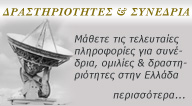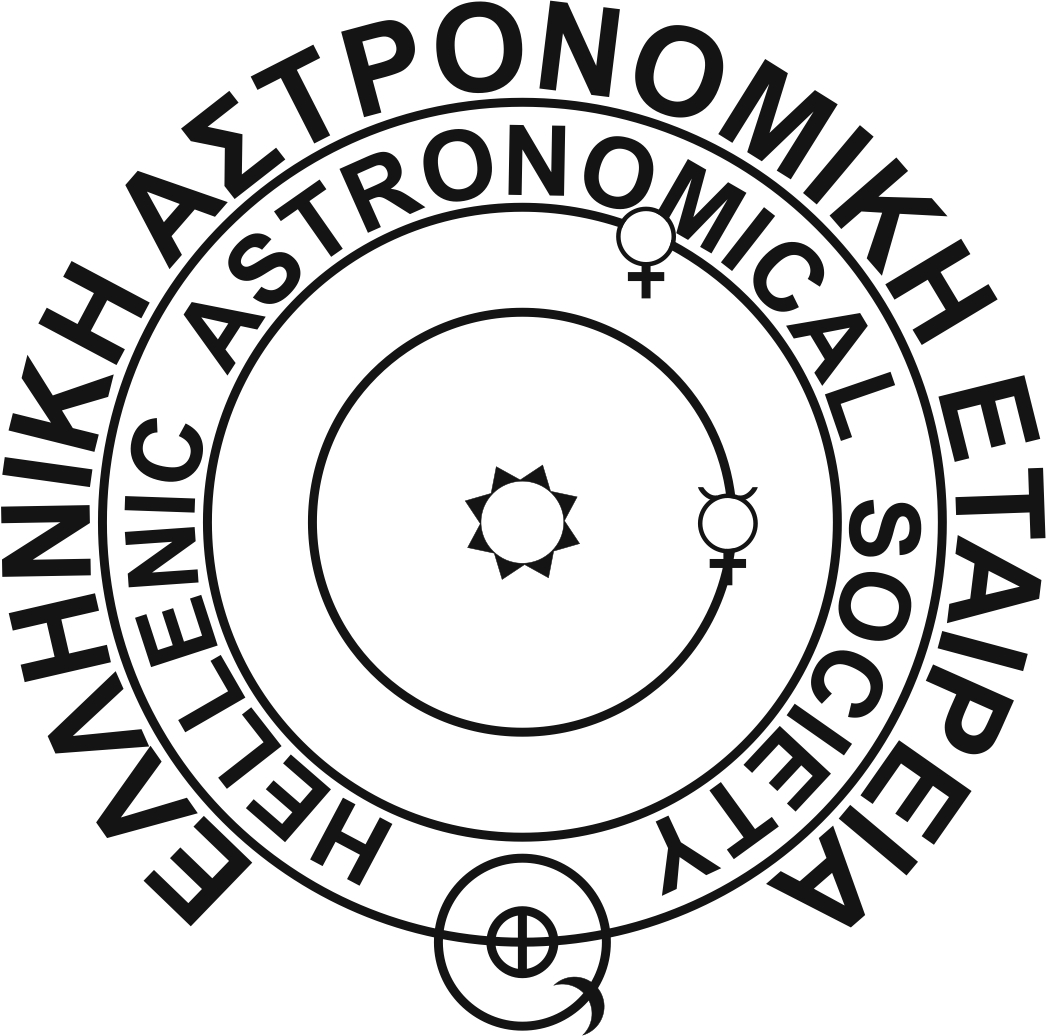%%%%%%%%%%%%%%%%%%%%%%%%%%%%%%%%%%%%%%%%%%%%%%%%%%%%%%%%%%%%%%%%%%%%%%%%
HELLENIC ASTRONOMICAL SOCIETY
ELECTRONIC NEWSLETTER
NUMBER 103 September 2006
------------------------------------------------------------------------
E-mail: elaset@astro.auth.gr WWW: http://www.astro.auth.gr/elaset
------------------------------------------------------------------------
TOPICS:
1. The Elections of Hel.A.S.
2. Report on the XXVIth IAU General Assembly
3. Upcoming Astronomy meetings in Greece
4. About this Newsletter
1. THE ELECTIONS OF HEL.A.S.
----------------------------
As it is well known by now the forthcoming General Assembly and
elections of the Society will take place on Friday September 22nd,
2006 (the Fall Equinox) at the Section of Astrophysics, Astronomy
and Mechanics of the University of Athens. This General Assembly
was originally planned for June 20th, 2006 but it has been shifted
to this new date due to the prolonged "sit-in" (katalhpsh) by the
University students. All other details, such as hours/programe/
invited Hel.A.S. talk by prof. J. Papamastorakis remain as
previously announced. The items in the agenda remain as in the
initial announcement which is available in the web page:
http://www.astro.auth.gr/elaset/events/elections2006a.pdf
We wish to remind all members that if they wish to nominate/sponsor
any new members they should do so by ensuring that all applications
reach the Secretary before the General Assembly of Hel.A.S. More
information for the Hel.A.S. membership requirements are at:
http://www.astro.auth.gr/elaset/membership.html
Finally, as stated by the Constitution, members need to have payed
their membership fees in order to be eligible to vote. Those
uncertain about outstanding dues they should contact the Treasurer
of Hel.A.S., Prof. Theodossiou as soon as possible.
2. REPORT ON THE XXVIth IAU GENERAL ASSEMBLY
--------------------------------------------
The XXVI IAU General Assembly took place in Prague, capital of the
Czech Republic, from 14th to 25th of August. A number of Greek
members of the IAU or young scientists were present during this GA
and some of them presented their work orally or in the poster form.
In the official level, the IAU has a new President, Mrs. Catherine
J. Cesarsky (President elect Robert Williams) and a new General
Secretary, Dr. Karel A. van der Hucht (Assistant General Secretary
Ian F. Corbett) and six Vise-presidents, Beatriz Barbuy, Cheng Fang,
Martha P. Haynes, George K. Miley, Giancarlo Setti and Brian Warner.
During the GA the names of the new Presidents and Vice-presidents of
the Divisions of the IAU were announced. We have to congratulate
Dr. Despoina Hatzidemetriou, for been elected Vice-President of her
Division. In the Financial Committee an increase of the number of
Categories was decided, with the categories XI and XII with 60 and
80 contribution units added at the upper end of the contribution
range, mainly to permit USA, which has almost the half population of
the IAU members, to pay more. Greece stays at the Category III with
4 units of payment and 4 votes for financial matters. The budget for
2003-2006 was accepted as well as the proposed budget of 2006-2009,
which includes a 3% annual inflation of the contributions, something
that irritated many National Representatives. The Nominating
Committee accepted the 925 new members proposed by the National
Astronomical Committees (included around 40 members proposed by the
Presidents of the Divisions), increasing the total number of the IAU
members to 9.785. The new Greek members accepted are: Tom Krimigis,
Christos Siopis, Iossif Papadakis, Demetrios Goulliermis, Emmanouil
Xilouris and John Contopoulos. In the scientific part of the GA
there were many and interesting sessions and invited
presentations. The whole GA voted some minor modifications in the
Statutes and Bye-laws of the Union proposed by the Executive
Committee. Long heated discussions were made during the GA for the
definition of a "planet". Three or four editions of the respective
Resolution 5A were proposed and withdrawn during the 11 days of the
Assembly. I copy the last version of the proposal which came in
front of the GA and was voted with minor changes included here:
IAU Resolution: Definition of a Planet in the Solar System
Contemporary observations are changing our understanding of
planetary systems, and it is important that our nomenclature for
objects reflect our current understanding. This applies, in
particular, to the designation "planets". The word "planet"
originally described "wanderers" that were known only as mobbing
lights in the sky. Recent discoveries lead us to create a new
definition, which we can make using currently available scientific
information.
Resolution 5A
The IAU therefore resolves that planets and other bodies, except
satellites, in our Solar System be defined into three distinct
categories in the following way:
(1) A planet is a celestial body that (a) is in orbit around the
Sun, (b) has sufficient mass for its self-gravity to overcome rigid
body forces so that it assumes a hydrostatic equilibrium (nearly
round) shape, and (c) has cleared the neighborhood around its
orbit.
(2) A "dwarf planet" is a celestial body that (a) is in orbit
around the Sun, (b) has sufficient mass for its self-gravity to
overcome rigid body forces so that it assumes a hydrostatic
equilibrium (nearly round) shape, (c) has not cleared the
neighborhood around its orbit, and (d) is not a satellite.
(3) All other objects, except satellites orbiting the Sun shall
be referred to collectively as "Small Solar System Bodies".
Notes:
1. The eight planets are: Mercury, Venus, Earth, Mars, Jupiter,
Saturn, Uranus and Neptune.
2. An IAU process will be established to assign borderline objects
into either "dwarf planet" or other categories.
3. "Small Solar System Bodies" currently include most of the Solar
System asteroids, most Trans- Neptunian Objects (TNO's), comets
and other small bodies.
IAU Resolution 6A: Pluto
The IAU further resolves that Pluto is a "dwarf planet" by the
above definition and is recognized as the prototype of a new
category of trans-Neptunian objects.
These are the resolutions voted positively by the majority of the
GA. However, a proposition to call the eight planets "classical" and
another to call the new category of objects referred to Resolution
6A "plutonians" did not pass.
Finally it was announced that the 2012 IAU General Assembly (2009
is in Rio de Janeiro, Brazil) will be taking place in Beijing, China
from 12 to 25 August. Thessaloniki has expressed a strong interest
for that GA (presented by Professor J. Seiradakis), as they had
Paris and Munich, but the Executive Committee chosen Beijing.
Paul G. Laskarides
Chairman of the Greek National Committee for Astronomy
National Representative to the IAU
3. UPCOMING ASTRONOMY MEETINGS IN GREECE
----------------------------------------
The following meetings will take place in Greece. Please check the
corresponding web page or contact the organizers by e-mail for more
information.
*************************
"Solar Orbiter Workshop II"
Acropolis Divani Hotel, Athens, 16 - 20 October 2006
More information can be found at:
http://conferences.phys.uoa.gr/solo2006/
*************************
"Extreme solar Systems"
Santorini Island, 24 - 29 June 2007
http://www.astro.northwestern.edu/Santorini2007/
*************************
4. ABOUT THIS NEWSLETTER
------------------------
This Newsletter was edited by Vassilis Charmandaris and Kanaris
Tsinganos. It was forwarded to the 250, out of the 268, members of
Hel.A.S. who have e-mail access.
The next edition of the Newsletter will be mailed around October 1st
2006. Please send your announcements (e.g. appointments/departures,
job openings, research opportunities, awards, conferences in
Greece) or comments before September 25, 2006. All correspondence
concerning the Newsletter should be addressed to:
tsingan@phys.uoa.gr
If you do not wish to receive future issues of this Newsletter or
the e-mail address to which it was sent is not your preferred one,
please let us know.
-------------------------------------------------------------------------
END-------HELLENIC ASTRONOMICAL SOCIETY ELECTRONIC NEWSLETTER--------END
-------------------------------------------------------------------------







